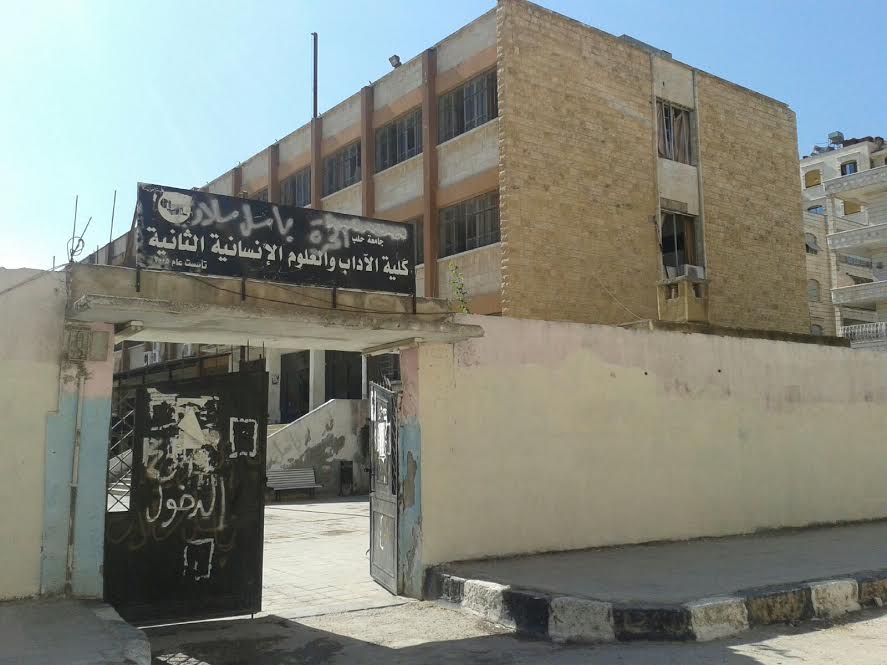Building Idlib’s New Universities

Mohammad was at a crossroads in his life. Having recently finished secondary school, his natural move would have been to go on to university.
However, the teenager had been studying at a school run by the Syrian National Coalition (SNC). This complicated matters, as only a handful of universities would recognise his high school diploma.
(See also Syria: Confusion Reigns in Kfar Nabel’s School System ).
Not knowing what to do, Mohammed sought the advice of Ahmad Hannak, who works in the education sector in Kfar Nabel and is developing online study courses.
Hannak encouraged him to enrol at the Free Aleppo University, founded last year by rebel factions. It accepts applicants from both government and SNC schools.
Due to the instability of the entire Syrian education system, Hannak told Damascus Bureau, it was pointless to focus on the issue of degree recognition right now. Deteriorating standards could mean that even degrees obtained from government universities might not be recognised in the future.
Hannak said that the best option was for students graduating from “free” universities to be issued a certificate stating they had completed their higher studies, rather than being awarded a formal degree.

The issue of recognition, he added, would only be resolved after one or two generations of students had graduated.
SMOOTH TRANSITION
Previously known as Idlib University, the Free Aleppo University was re-inaugurated by the civil administration of Jaish al-Fatah [a coalition of rebel and Islamic factions] on September 16, 2015.
The university has kept all its previous faculties and departments.
Degrees in mathematics, physics, chemistry and biology are taught in the faculty of science, while archaeology, history, Arabic, English and French literature comes under the auspices of the faculty of arts and humanities.
There are also faculties of education, law and computing, and the university has introduced colleges that teach nursing, pharmacy and Sharia.
Furthermore, according to its dean Anas al-Hasud, the university is seeking to open medical and dentistry colleges. Work is in progress to secure a suitable location and equipment and recruit teaching staff.
Al-Hasud also told Damascus Bureau that he was working to obtain official recognition from a number of other institutions, including the university of Tripoli in Lebanon and Düzce university in Turkey.
The transition for most students has been smooth.
When Ala began his first year at law school, the university was still under government control. By the time he started his second year, Idlib had been liberated.
“I’m very happy because nothing has changed at my university. I’m still taught by the same professors, in the same classrooms, along with my old classmates,” the 21 year-old told Damascus Bureau.
Ala said that the number of students attending Free Aleppo University had increased by almost three times in comparison to last year. Most students find it safer to study here than make the journey to universities in government-controlled areas.
Moreover, for degrees where no practical work is involved such as law, students can study at home with no need to physically attend daily lectures. Of course this is not possible for degrees where practical lessons are a requirement.
Annual fees for attending Free Aleppo University vary according to specialty, ranging between 100 to 200 US dollars.
Lina, a 20 year-old student told Damascus Bureau she didn’t think twice about enrolling at the university as soon as it re-opened under opposition leadership.
“I never thought the day would come when I would put my secondary school certificate to use,” she said.
Lina had obtained her certificate in 2013 from an SNC school while living in Turkey as a refugee. She said that she was not worried about her degree being recognised, arguing that education never goes to waste.
Some students resent paying, however, such as Lina’s friend Nora.
“I don’t believe I should be paying these fees, especially as the university isn’t recognised,” the 20 year-old said.
Nora began her studies at the university when it was still under government control. Now she is thinking of quitting as she cannot afford to pay the fees, buy textbooks or cover travel expenses.
Free Aleppo University isn’t the only option for students living in Idlib and the surrounding countryside. Another such institute is Kfar Nabel’s Oxford University, founded on November 12, 2014.
The university has no connection with Oxford University in the UK. It is an affiliate of the Oxford University for Science whose headquarters is in Sanaa, Yemen.
Kfar Nabel’s branch is a virtual university founded by Hannak and several of his colleagues, including chairman Amar Qadur, deputy dean Rashid Sheikho, and head of the trustee council Muheddine Kinana.
“The university has secured all necessary equipment and we are currently looking to rent a building for our premises,” Hannak told Damascus Bureau.
A second branch has also been founded in the town of al-Atarib in rural Aleppo.
Tuition at these two virtual universities will be conducted online by teachers from Iraq, Egypt and Syria who are based in Gaziantep, Turkey.
According to Qadur, in spite of obtaining authorisation from headquarters in Yemen to open the university almost a year ago, there has been a delay in implementing the project.
He attributes this delay to the doubts students have regarding the programme and their academic future.
But not all students are hesitant to join the institute. Nahid, who is interested in business studies, said that there were several advantages.
“Kfar Nabel’s Oxford University offers a degree in business administration which is not available in other universities,” she said.
“Attending classes while at home is an added bonus, as it spares me the trouble of commuting.”
Maha Rabah is the pseudonym of a Damascus Bureau contributor from Kfar Nabel and a graduate of an IWPR print journalism course.
Read the Arabic version of this article here
